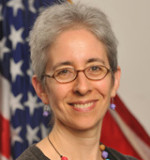 For public leaders at the federal, state and local levels who want to strengthen their agencies’ abilities to learn what works and to continually improve performance, building program evaluation capacity within their agencies is essential. But what are the building blocks of that capacity? And why is the relationship between an evaluation office and a program office within an agency so important?
For public leaders at the federal, state and local levels who want to strengthen their agencies’ abilities to learn what works and to continually improve performance, building program evaluation capacity within their agencies is essential. But what are the building blocks of that capacity? And why is the relationship between an evaluation office and a program office within an agency so important?
To explore these and other related issues, we speak with Naomi Goldstein, the Director of the Office of Planning, Research and Evaluation within the Administration for Children and Families (ACF) at the U.S. Department of Health and Human Services. In her role, she advises the Assistant Secretary for Children and Families on improving the effectiveness and efficiency of ACF programs. She is one of the leading experts in program evaluation within the federal government and was awarded the Presidential Rank of Distinguished Executive in 2012.
You may also be interested in reading ACF’s evaluation policy, launched in 2012, which is designed to confirm ACF’s “commitment to conducting evaluations and to using evidence from evaluations to inform policy and practice.”
Web extra: Naomi Goldstein discusses the similarities and differences between program evaluation and performance management. [click here] As a postscript, she commented after our interview about the value of combining typical performance management and evaluation approaches, including how experimental evaluations that use administrative data can produce relatively quick and inexpensive results.